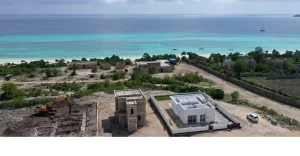The Court of Appeal has recently quashed a highly questionable ruling of the Registrar of the High Court of Zanzibar who had reduced the bill in 2017 to $5.7 million (about Sh13.1 billion).
Three justices of appeal Stella Mugasha, Ignas Kitusi and Sam Rumanyika could not hide their displeasure over a three-decade delay in paying Laemthong Rice Co. Ltd which supplied rice to the Zanzibar government.
“This matter does not speak very well of timely justice,” said the justices in their recent decision.
The Court of Appeal has rejected government’s attempts to lower the amount and insisted they stand by December 2000 order of the High Court for the Zanzibar government to pay the rice supplier $69 million.
Yesterday, Zanzibar Minister of State in the President’s Office responsible for Finance and Planning, Saada Salum Mkuya admitted she was aware of the case but could not give the ministry’s position because she has not seen the judgment. ”I know about the issue but I have not seen that judgment, so I cannot say anything,” said the minister.
Zanzibar orders rice
The transaction of what would later turn to be one of the long delayed cases was made on July 23, 1985 when the Zanzibar government ordered for 39,900 tonnes of rice at $12.9 million, with a 25 percent interest annually.
According to court records it took quite a long time for the Isles government to fulfil its contractual obligation as it delayed to make full payment of the ordered rice.
Left with no option, the Bankok-based company brought a suit against the Zanzibar government in efforts to have the Zanzibar authorities settle the debt.
The reason why the dispute has remained pending in courts for many years can be explained by Zanzibar’s government’s refusal to accept the $69 million at wanted it reduced to 45.7 million.
There were also issues on how the execution should be carried out.
After dragging for years in court, the High Court ordered on December 18, 2000, that the Zanzibar Government has to pay the Thailand company the balance and the accumulated interest that totaled $69 million.
Execution fails
Even after the court’s clear position, execution of the decree proved to be a nightmare and the amount to be paid remained a deadlock.
This came after the Registrar of the High Court, in a total disregard of the 2000 court decision, issued a certificate for the amount of $5.7 million purporting it to be the amount Mkusa J had ordered in a previous ruling.
At the hearing of an appeal that sought to challenge the decision of the registrar, lawyer for Laemthong Rice Co., Ltd., Juma Nassoro argued that neither Mkusa J nor the parties could vary the decree.
The rice company had gone further to challenge the Registrar’s decision by way of reference to the High Court but was dismissed by Judge Mohammed.
The lawyer argued that the matter, having reached the Court of Appeal, it was an error for the High Court to decline to fault the Registrar’s certification of $45.7 million instead of $69 million.
With reference to the case of Victoria Real Estate Development Limited vs Tanzania Investment Bank & 3 others, Mr Nassoro argued that parties may not vary a court decree by settlement as such powers are only enjoyed before the court makes its decision.
Appeal court rejects altered $45.7 million
“From the concurrent arguments of Messrs Nassoro and Hassan for the appellant and respondent respectively, the ruling by the Registrar certifying 45.7 million was wrong whatever arguments that had been put forward,” said justices of appeal.
The rice was delivered in three shipments between 1986 and 1988. Efforts by the firm to secure settlement of the debt has proved futile over 37 years although the Zanzibar government did not deny the debt but actually acknowledged it on 15 May, 1996.
The company thereafter sued the Zanzibar government in the High Court claiming for $69 million together with interest at 25 percent annually from January 1997 until full payment.
It is on record that the Zanzibar government which was being represented by the Attorney General Chambers in Zanzibar, failed to file any defence due to his lack of cooperation with the chambers.
This led to the chamber withdrawing in frustration and to an ex-parte judgment.
“The above has remained the position, the learned Registrar had no powers to alter the ex-parte judgment and decree of the High Court, nor the previous order of this court in this case.
“Similarly, in dismissing the application for reference, the High Court abdicated its duty to correct the Registrar’s manifest error.
“For those reasons, we allow this appeal. Consequently, we quash the Registrar’s ruling as well as the ruling of the High Court. We set aside the certification of $5.7 million and stand by our judgment dated 18 December, 2000,” said the judges.
Share this news
This Year’s Most Read News Stories

Tato faults Zanzibar mandatory insurance for arriving visitors
Tato chairman has dismissed the new policy is an unnecessary and duplicative burden on touristsContinue Reading

Tanzania readying to talk to British developer over Zanzibar land lease revocation
Dar es Salaam. British firm Pennyroyal Limited has said it will sue the Tanzanian government over leasehold revocation in Zanzibar, but the Attorney General has confirmed that they are preparing to meet with the investor.Continue Reading

Cracks show as Zanzibar’s CCM ruling party looks to 2025 polls
Cracks show as Zanzibar’s CCM ruling party looks to 2025 polls over Mr Karume’s allegation against the administration. Time for the ruling party to take stock?Continue Reading












